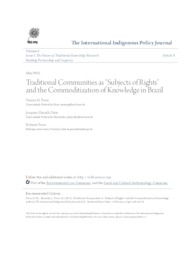Traditional communities as "Subjects of Rights" and the commoditization of knowledge in Brazil.
Traditional communities as "Subjects of Rights" and the commoditization of knowledge in Brazil.
Author(s): PORRO, N. M.; SHIRAISHI NETO, J.; PORRO, R.
Summary: The International Labor Organization (ILO) Convention 169 and the Convention of Biological Diversity (CBD) led signatory state-members to recognize traditional communities as subjects of rights, and no longer as objects of tutelage. However, their implementation may bring new challenges in states adopting market-based decision-making to rule social life. In pluri-ethnic societies in which power differentials are structurally embedded, traditional communities and companies exploring their resources and knowledge have been, historically, unequal and opposed parties. In processes of benefit sharing, these unequal social actors are wrongfully considered equally free subjects of rights in negotiating contracts in supposedly free markets. Erasing historical and structural differences, and assuming equality in an unequal world will only reproduce the inequality that CBD has aimed to address.
Publication year: 2015
Types of publication: Journal article
Unit: Embrapa Eastern Amazon
Keywords: Amazonia, Comunidade tradicional, Conhecimento tradicional
Observation
Some of Embrapa's publications are published as ePub files. To read them, use or download one of the following free software options to your computer or mobile device. Android: Google Play Books; IOS: iBooks; Windows and Linux: Calibre.
Access other publications
Access the Agricultural Research Database (BDPA) to consult Embrapa's full library collection and records.
Visit Embrapa Bookstore to purchase books and other publications sold by Embrapa.

